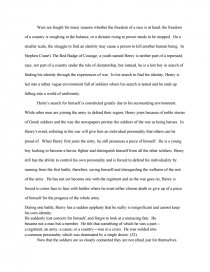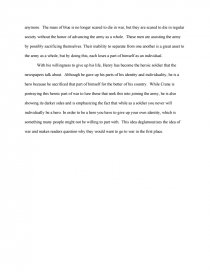Red Badge of Courage
Essay by review • March 4, 2011 • Book/Movie Report • 628 Words (3 Pages) • 1,267 Views
Wars are fought for many reasons whether the freedom of a race is at hand, the freedom of a country is weighing in the balance, or a dictator rising to power needs to be stopped. On a smaller scale, the struggle to find an identity may cause a person to kill another human being. In Stephen Crane's The Red Badge of Courage, a youth named Henry is neither part of a repressed race, nor part of a country under the rule of dictatorship, but instead, he is a lost boy in search of finding his identity through the experiences of war. In his search to find his identity, Henry is led into a rather vague environment full of soldiers where his search is tested and he ends up falling into a world of uniformity.
Henry's search for himself is constricted greatly due to his surrounding environment. While other men are joining the army to defend their region, Henry joins because of noble stories of Greek soldiers and the way the newspapers portray the soldiers of the war as being heroes. In Henry's mind, enlisting in the war will give him an individual personality that others can be proud of. When Henry first joins the army, he still possesses a piece of himself. He is a young boy looking to become a heroic fighter and distinguish himself from all the other soldiers. Henry still has the ability to control his own personality and is forced to defend his individuality by running from the first battle, therefore, saving himself and disregarding the wellness of the rest of the army. He has not yet become one with the regiment and as the war goes on, Henry is forced to come face to face with battles where he must either choose death or give up of a piece of himself for the progress of the whole army.
During one battle, Henry has a sudden epiphany that he really is insignificant and cannot keep his own identity:
He suddenly lost concern for himself, and forgot to look at a menacing fate. He
became not a man but a member. He felt that something of which he was a part---
a regiment, an army, a cause, or a country---was in a crisis. He was welded into
a common personality which was dominated by a single desire. (32).
Now that the soldiers are so closely connected they are not afraid just for themselves anymore. The mass of blue is no longer scared to die
...
...

